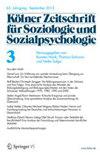“归属”:万事尘埃落定和民主价值
IF 0.9
3区 社会学
Q4 PSYCHOLOGY, SOCIAL
Kolner Zeitschrift Fur Soziologie Und Sozialpsychologie
Pub Date : 2023-11-06
DOI:10.1007/s11577-023-00908-0
引用次数: 0
摘要
如何解释对民主的支持?我们提出这个问题的背景是,学者断言,民主价值观在长期民主国家的公民中,尤其是在年轻人中正在减弱。我们利用对年轻瑞典人的小组调查来探索亲民主情绪随时间的发展。调查归属——具体来说,在瑞典、市政当局和社区中感到“宾至如归”——是否加强了对民主的支持,我们发现它确实对民主的原则支持产生了积极影响。相对而言,我们发现归属感的影响比社会经济地位和社会资本等众所周知的预测因素更强。我们的分析旨在为民主价值观的学术研究提供信息,并阐明归属对政治行为的影响。它还提供了以归属感的形式在年轻的民主公民中发展社会融合的方式:通过感觉融入一系列社会社区。本文章由计算机程序翻译,如有差异,请以英文原文为准。
„Dazugehören“: Zugehörigkeitsempfindungen und demokratische Werte
Abstract What explains support for democracy? We ask this question in the context of scholarly assertions that democratic values are weakening among citizens of long-time democracies, most notably among young people. We leverage a panel survey of young Swedes to explore the development of pro-democratic sentiments over time. Investigating whether belonging—specifically, feeling “at home” in Sweden, the municipality, and the neighborhood—strengthens support for democracy, we find that it does positively influence principled support for democracy. In relative terms, we find the impact of belonging to be stronger than that of well-known predictors such as socio-economic status and social capital. Our analysis stands to inform scholarship on democratic values and to illuminate the implications of belonging for political behavior. It also offers insight into the ways that societal integration in the form of belonging can develop among young democratic citizens: through feeling integrated into a range of social communities.
求助全文
通过发布文献求助,成功后即可免费获取论文全文。
去求助
来源期刊
CiteScore
2.30
自引率
6.70%
发文量
55
期刊介绍:
The sociology journal Kölner Zeitschrift für Soziologie und Sozialpsychologie (KZfSS) ("Cologne Journal of Sociology and Social Psychology") was founded in 1948 by the Cologne sociologist Leopold von Wiese as the Kölner Zeitschrift für Soziologie. His successor, René König, broadened the journal''s scope towards social psychological topics, including cultural sociology and qualitative social research, which gave the journal its current name.
KZfSS is the most important sociological publication in the German-speaking world in terms of its scope and distribution. It publishes comprehensively on German sociological research in all disciplines and regularly communicates research results from many countries around the world.
KZfSS follows the model of a universal sociology journal. In addition to more than 40 double-blind peer-reviewed original research articles per year, it publishes detailed literature reviews and book reviews of German and international literature in a comprehensive review section. The journal thus provides a forum for sociological research and open discussion. Special emphasis is placed on offering young colleagues an opportunity for their first publication.
The journal is included in many renowned scientific Abstracting & Indexing databases such as the Social Science Citation Index.
In addition to the four annual issues, a supplement coordinated by guest editors is published annually.

 求助内容:
求助内容: 应助结果提醒方式:
应助结果提醒方式:


